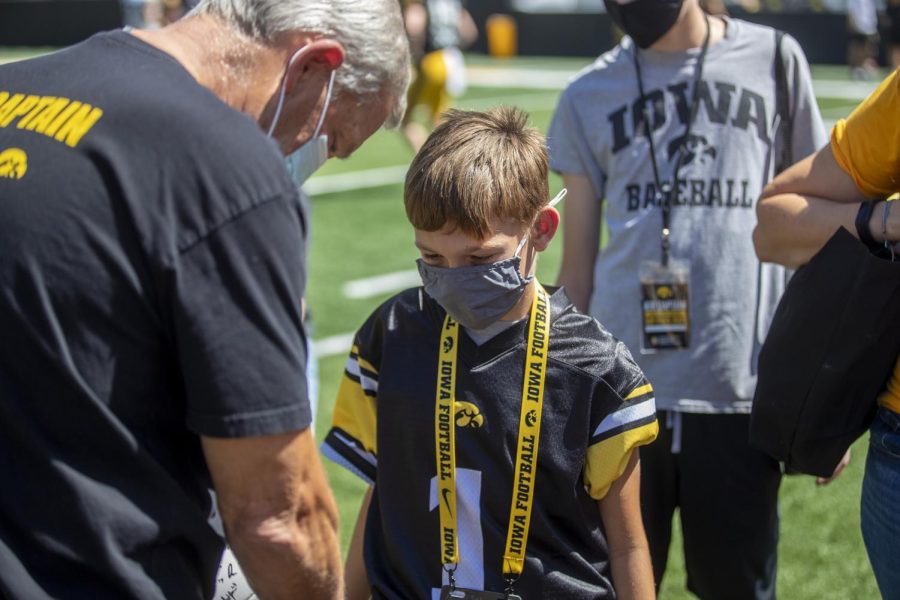Kid Captain Blake Burdorf overcomes near-impossible odds
Burdorf was given a 10 percent chance to live before he was born.
Iowa kid captain Blake Burdof waits for an autograph from head coach Kirk Ferentz during “Kid’s Day at Kinnick” inside Kinnick Stadium on Saturday, Aug. 14.
November 23, 2021
For the first five months of her pregnancy, Jamie Burdorf didn’t know she was carrying twins.
Doctors told Burdorf that baby A looked good, but baby B has some slight dilation around his kidneys 20 weeks into her pregnancy. After her ultrasound, Burdorf was told to visit a specialist in Des Moines. Burdorf characterized the day of her visit as one of her “crappiest days.”
The specialist gave this week’s Kid Captain Blake Burdorf a 10 percent chance of survival.
Jamie and her husband Aaron were given a list of intervention options, but some posed the risk of harming both the twins Jamie was carrying. So, the pair decided to wait it out.
Jamie birthed Blake and Bowen Burdorf in Des Moines after 37 weeks of pregnancy. About 24 hours after he was born, Blake was taken to the University of Iowa Hospitals and Clinics via ambulance to be treated for kidney disease.
Blake was in the hospital for 70 days before he was released. Eventually, he had a dialysis catheter and feeding tube put in.
UIHC Clinical Professor of Pediatrics in Nephrology, dialysis, and transplantation Jennifer Jetton said dialysis is essentially kidney replacement therapy. When the kidney can’t regulate the body’s electrolytes and waste products, dialysis is used to do so.
Blake started Peritoneal dialysis — an at-home form of the treatment— after he was discharged from the hospital. Jetton said the catheter is inserted into the baby’s belly, and then families are taught how to hook their baby up to their at-home dialysis machine. Typically, Peritoneal dialysis treatment is administered overnight.
While the Burdorfs hooked Blake up for feeding and dialysis each night, they waited for him to get big enough for a kidney transplant.
After more than two years of feeding tubes and dialysis machines, Blake was finally ready for a kidney transplant, but the Burdorfs struggled to find a donor. Jamie wasn’t a blood type match for Blake, and Aaron’s blood pressure was too high for the procedure.
RELATED: Punter Tory Taylor to return to Iowa for 2022 college football season
The Burdorfs also had to wait for a living donor. Because Blake’s bladder was damaged in utero, he needed to have his bladder reconstructed and his kidney replaced at the same time. A procedure like that requires a live donor.
Blake’s donor ultimately proved to be a complete stranger. Steph Stoll, a former Iowa City resident, responded to a Facebook post of Jamie’s, noting that she was interested in being Blake’s donor. Once all the paperwork was done and the transplant was approved by a transplant board, Blake was officially ready to receive a kidney from Stoll.
Blake was discharged from the hospital three weeks after his transplant. Though, his stint at home wasn’t long. A week after he had been permitted to leave the hospital, Blake fell ill.
Lab tests he underwent in Des Moines showed that Blake’s white blood cell counts were high. The Burdorfs then took Blake to UIHC, where he was diagnosed with a major infection.
“Blake went septic,” Aaron said. “All of his internal organs were blowing up and swelling. His abdomen kind of looked like it had a basketball in it.
“The doctors and nurses were telling us things,” Aaron added. “We were just like, ‘Help, whatever you have to do. Quit asking us questions, you’re the doctors. Just do what you need to do.’”
Blake was connected to an Extracorporeal membrane oxygenation (ECMO) machine. UIHC Assistant Director of Pediatrics in Nephrology, dialysis, and transplantation Lyndsay Harshman said ECMO machines basically bypass a person’s heart and lung function.
“You’re so sick, your body can’t function,” Harshman said. “So, the hospital has to do everything. ECMO is the last resort we have to take care of a patient who’s that acutely ill. Blake needed it.”
Blake was in a medically induced coma for a month. Aaron said surgeons cut his son open from his breastbone to his pelvis, took everything out, washed him, cleaned him, and then put him on antibiotics.
Blake was hospitalized for nearly five months to fight off infections. He even had to rebuild the muscle mass in his legs and arms to do things as basic as walking because he was bedridden with the infections for so long.
Fast forward more than five years after his stay of more than 100 days in the hospital, and Blake is now like any other 10-year-old. He participates in baseball and wrestling. He also enjoys playing video games with his friends.
“The best part of my job is seeing these kids grow up, and thrive, and do all the things they want to do,” Harshman said. “They can play baseball. They can spend time with friends. They can be in school every day. The best part of my job is to see these kids just take off and absolutely develop and grow.”



